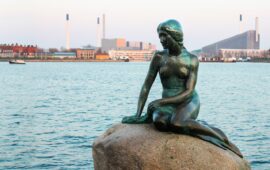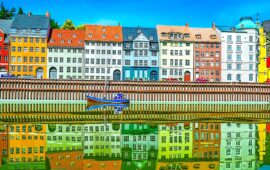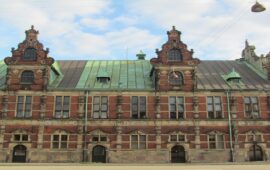Denmark, a small country located in Northern Europe, is known for its high standard of living, rich culture, and friendly people. The Danish society is characterized by a number of unique features that set it apart from other countries, especially when it comes to social life. In this article, we will explore some of the peculiarities of social life in Denmark.
One of the most striking features of social life in Denmark is the concept of “hygge”. Hygge, which is pronounced “hoo-ga”, is a Danish word that roughly translates to “coziness” or “contentment”. It is a cultural phenomenon that emphasizes the importance of creating a warm and inviting atmosphere, often through the use of candles, soft lighting, warm blankets, and good company. The idea of hygge is deeply ingrained in Danish culture, and it is often cited as one of the reasons why Denmark consistently ranks as one of the happiest countries in the world.
Another aspect of social life in Denmark is the concept of “Janteloven”. Janteloven, which translates to “the law of Jante”, is a set of social norms that discourage individualism and promote humility. The law of Jante is based on the idea that no individual should consider themselves superior to others, and that everyone should be treated equally. This can manifest itself in many ways, such as a reluctance to show off wealth or achievements, or a tendency to downplay one’s own accomplishments in order to avoid standing out from the crowd.
Social gatherings in Denmark are also unique in their own way. For example, it is common for Danes to have a “dinner club”, which is a group of friends or family members who take turns hosting dinner parties. These dinner parties are often elaborate affairs, with multiple courses and plenty of wine, and they are seen as an opportunity to socialize and catch up with friends in a relaxed setting. Similarly, it is not uncommon for Danes to invite friends over for “coffee and cake” in the afternoon, which is a casual way of spending time together and enjoying some sweet treats.
In Denmark, there is also a strong emphasis on community and social welfare. The Danish welfare state is known for providing a high level of support to its citizens, with universal healthcare, free education, and generous social safety nets. This focus on community extends beyond the government, with many Danes volunteering their time and resources to help those in need. For example, it is common for Danes to participate in “street parties”, which are neighborhood events where people come together to eat, drink, and socialize. These parties are often organized by volunteers, and they serve as a way to build community spirit and strengthen social bonds.
Another unique feature of social life in Denmark is the importance of the bicycle. Denmark is known as a “bicycle-friendly” country, with dedicated bike lanes and a strong cycling culture. Bikes are a common mode of transportation, and it is not uncommon to see entire families riding together on their way to school or work. This emphasis on cycling has a number of social benefits, including reducing traffic congestion, promoting physical fitness, and creating a sense of community among cyclists.
Finally, it is worth noting that Denmark is a very egalitarian society, with a strong emphasis on gender equality. Women are well-represented in politics and the workforce, and there is a widespread belief that men and women should have equal opportunities and be treated with the same respect. This egalitarianism extends to social situations as well, with a general expectation that everyone should be treated equally regardless of their background or social status.
In conclusion, social life in Denmark is characterized by a number of unique features that set it apart from other countries.
Copenhagen is a vibrant city that has long been a popular destination for expats from around the world. The city’s high quality of life, progressive values and strong economy make it an attractive place to live for many people. However, as with any city, there are certain peculiarities of expat life in Copenhagen that are worth noting.
One of the first things that expats in Copenhagen often notice is the high cost of living. Denmark is known for having some of the highest taxes in the world, and this is reflected in the prices of goods and services in the country. Expats who are used to lower prices in their home countries may find that they need to adjust their budgets when living in Copenhagen.
Another aspect of expat life in Copenhagen is the strong emphasis on work-life balance. Danes place a high value on leisure time, and many companies have policies in place to support this. It’s common for employees to have a certain number of vacation days per year, and many companies offer flexible work arrangements, such as working from home or a “Friday bar” where employees can meet with colleagues for drinks at the end of the week.
For expats with families, Copenhagen offers a number of excellent educational opportunities. The city is home to several international schools that cater to expat children, as well as a large number of public schools that offer a high quality education. However, parents should be aware that the school system in Denmark can be quite different from what they are used to in their home countries. For example, Danish schools place a strong emphasis on group work and independent learning, and students are expected to take a high degree of responsibility for their own education.
Another important aspect of expat life in Copenhagen is the city’s cycling culture. Copenhagen is one of the most bicycle-friendly cities in the world, with an extensive network of bicycle lanes and bicycle-friendly infrastructure. Many expats find that biking is the best way to get around the city, and there are several bike rental services available for those who don’t own a bike.
One of the biggest challenges of expat life in Copenhagen is the language barrier. Although many Danes speak excellent English, it can still be difficult for expats to navigate everyday life in a foreign language. It’s worth making an effort to learn Danish, even at a basic level, as it can make it easier to integrate into Danish society and connect with locals.
Finally, expats in Copenhagen should be aware of the city’s climate. Denmark has a temperate maritime climate, which means that the weather can be unpredictable and changeable. Summers can be warm and sunny, but winters can be long, dark and cold. Expats should be prepared for the possibility of harsh weather conditions and invest in warm clothing and equipment to stay comfortable during the winter months.
Overall, expat life in Copenhagen offers a unique set of challenges and opportunities. While the high cost of living and language barrier can be difficult, the city’s cycling culture, emphasis on work-life balance, and excellent educational opportunities make it an attractive place to live for many people. With a little preparation and an open mind, expats in Copenhagen can enjoy all that this vibrant city has to offer.
One of the first things that expats in Copenhagen should be aware of is the high tax rate in Denmark. The country has some of the highest taxes in the world, with a top marginal tax rate of around 56%. This means that expats can expect to pay a significant portion of their income in taxes, which can impact their overall cost of living.
In addition to taxes, the cost of housing in Copenhagen can also be quite high. Like many major cities, Copenhagen has seen a surge in housing prices in recent years, and the cost of renting or buying a home can be quite steep. According to Numbeo, a website that tracks the cost of living in different cities around the world, the average cost of a one-bedroom apartment in the city center of Copenhagen is around 9,500 DKK (approximately $1,500 USD) per month. However, prices can vary widely depending on the location and size of the apartment.
Food is another area where expats may find that costs are higher than they are used to. While there are certainly affordable dining options available in Copenhagen, the cost of eating out can be quite high at many restaurants. Expats may also find that the cost of groceries is higher than they are used to, particularly if they are accustomed to shopping at discount supermarkets. According to Numbeo, the cost of a meal for two at a mid-range restaurant in Copenhagen is around 600 DKK (approximately $95 USD).
Transportation is another area where expats may find that costs are higher than they are used to. While Copenhagen has an excellent public transportation system, including buses, trains, and the metro, the cost of a monthly pass can be quite high. According to the city’s official website, the cost of a monthly pass for all public transportation in the city is around 450 DKK (approximately $70 USD).
Despite the high cost of living, there are several factors that can help to offset the costs for expats in Copenhagen. For example, healthcare in Denmark is provided by the government and is free for all residents. This means that expats do not need to worry about the cost of health insurance or medical bills, which can be a significant expense in other countries.
Another factor that can help to offset the cost of living in Copenhagen is the city’s bike culture. Biking is a popular and convenient way to get around the city, and many expats find that they can save money on transportation costs by biking instead of using public transportation or owning a car.
Finally, it’s worth noting that salaries in Denmark are generally quite high, which can help to offset the high cost of living. According to data from the Danish statistics agency, the average monthly salary in Denmark in 2021 was around 38,000 DKK (approximately $6,000 USD). While this may not be enough to fully offset the high cost of living in Copenhagen, it can certainly help to make it more manageable.
Overall, expats in Copenhagen should be prepared for the high cost of living, particularly when it comes to housing and taxes. However, with careful budgeting and an eye towards cost-saving measures such as biking and public transportation, it’s possible to make a life in Copenhagen without breaking the bank. With its high quality of life, excellent healthcare, and strong economy, Copenhagen remains an attractive destination for expats from all over the world, despite the high cost of living.






